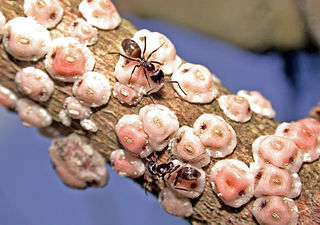Related Research Articles

Dorymyrmex is a genus of ants in the subfamily Dolichoderinae.

Dorymyrmex insanus is a species of pyramid ant, one of several species known as crazy ants, for their "frenetic" movement and swarming behavior. It is found in hot, dry habitats in the southern parts of the United States, much of Central America, and tropical South America. Dorymyrmex insanus is listed as Vulnerable by the International Union for Conservation of Nature (IUCN).
Dorymyrmex amazonicus is a Neotropical species of ant in the subfamily Dolichoderinae.

Dorymyrmex bicolor is a species of ant in the Dolichoderinae subfamily. Dorymyrmex bicolor was recently known as Conomyrma bicolor but has been renamed to Dorymyrmex bicolor. Dorymyrmex bicolor has a single petiole and a slit-like orifice which releases chemical compounds. This ant does not have the capability to sting. Dorymyrmex bicolor is primarily found in arid desert regions in Central and South America and the southwestern United States.
Dorymyrmex agallardoi is a species of ant in the genus Dorymyrmex. Described by Snelling in 1975, the species is endemic to Chile.
Dorymyrmex antarcticus is a species of ant in the genus Dorymyrmex. Described by Forel in 1904, the species is endemic to Argentina and Chile.
Dorymyrmex antillana is a species of ant in the genus Dorymyrmex. Described by Snelling in 2005, the species is endemic to Puerto Rico and the Dominican Republic, where they nest in open sandy areas.
Dorymyrmex chilensis is a species of ant in the genus Dorymyrmex. Described by Forel in 1911, the species is endemic to Chile.

Dorymyrmex flavopectus is a species of ant in the genus Dorymyrmex. Described by Smith in 1944, the species is endemic to the United States and Mexico.
Dorymyrmex hunti is a species of ant in the genus Dorymyrmex. Described by Snelling in 1975, the species is endemic to Chile.
Dorymyrmex hypocritus is a species of ant in the genus Dorymyrmex. Described by Snelling in 1975, the species is endemic to Chile.
Dorymyrmex incomptus is a species of ant in the genus Dorymyrmex. Described by Snelling in 1975, the species is endemic to Chile.

Dorymyrmex lipan is a species of ant in the genus Dorymyrmex. Described by Snelling in 1995, the species is endemic to the United States and Mexico.
Dorymyrmex minutus is a species of ant in the genus Dorymyrmex. Described by Emery in 1895, the species is endemic to Argentina and Chile

Dorymyrmex paiute is a species of ant in the genus Dorymyrmex. Described by Snelling in 1995, the species is endemic to the United States.
Dorymyrmex pappodes is a species of ant in the genus Dorymyrmex. Described by Snelling in 1975, the species is endemic to Chile.
Dorymyrmex planidens is a species of ant in the genus Dorymyrmex. Described by Gustav Mayr in 1868, the species is endemic to Argentina and Chile.

Dorymyrmex pogonius is a species of ant in the genus Dorymyrmex. Described by Snelling in 1975, the species is endemic to Chile.
Dorymyrmex tener is a species of ant in the genus Dorymyrmex. Described by Gustav Mayr in 1868, the species is endemic to Argentina and Chile.
Dorymyrmex xerophylus is a species of ant in the genus Dorymyrmex. Described by Cuezzo and Guerrero in 2011, the species is endemic to Colombia.
References
- ↑ Snelling, R. R.; Hunt, J. H. 1975. The ants of Chile (Hymenoptera: Formicidae). Rev. Chil. Entomol.9: 63-129 (page 97, Revived from synonymy and revived status as species)